
Recycled plastic bag
Yeni picked this one. I think it needs a clasp of some sort. What do you think?
Now I have to figure out how to get it to the USA. ;-)
Pick your prize
We have a winner!
Guess what this is?




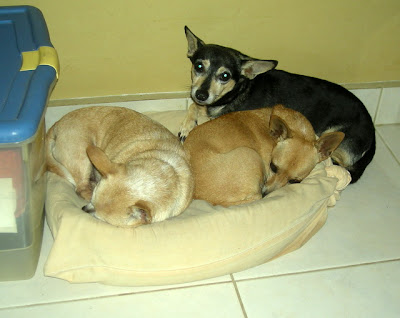




 Rambután (Nephelium lappaceum) is a tropical fruit common to the north coast area of Honduras. According to my CURLA Fruits of the Humid Tropics book, it was first introduced to Honduras at the Lancetilla Botanical Garden from Malaysia in 1926. The fruits may be red or yellow. The tree can be grown from sea level to 700 meters altitude in areas which receive at least 2 meters of rain annually.
Rambután (Nephelium lappaceum) is a tropical fruit common to the north coast area of Honduras. According to my CURLA Fruits of the Humid Tropics book, it was first introduced to Honduras at the Lancetilla Botanical Garden from Malaysia in 1926. The fruits may be red or yellow. The tree can be grown from sea level to 700 meters altitude in areas which receive at least 2 meters of rain annually. Unfortunately, the thin layer of fruit generally does not separate from the seed so easily. With a little chewing and sucking, you get a tiny bit of pulp but mostly juice. Often they are eaten around the kitchen table or outside with a large bowl or communal bucket in which to toss the peels and seeds.
Unfortunately, the thin layer of fruit generally does not separate from the seed so easily. With a little chewing and sucking, you get a tiny bit of pulp but mostly juice. Often they are eaten around the kitchen table or outside with a large bowl or communal bucket in which to toss the peels and seeds. These exotic rambutáns had about a half inch or more of sweet translucent fruit around the seed. But the best part is that the fruit cleanly and easily separated from the seed. Wikipedia calls this a "freestone" type. The trees of this and other equally good varieties are available at Centro Experimental y Demostrativo de Cacao (CEDEC - Experimental and Demonstrative Center of Cacao) in La Masica for L.110 (about US $5.80). According to CURLA, grafted trees can begin producing fruit in as little as 2-4 years.
These exotic rambutáns had about a half inch or more of sweet translucent fruit around the seed. But the best part is that the fruit cleanly and easily separated from the seed. Wikipedia calls this a "freestone" type. The trees of this and other equally good varieties are available at Centro Experimental y Demostrativo de Cacao (CEDEC - Experimental and Demonstrative Center of Cacao) in La Masica for L.110 (about US $5.80). According to CURLA, grafted trees can begin producing fruit in as little as 2-4 years. The fruit is similar to the lychee (Litchi chinensis) which you may be more familiar with, but the lychee fruit isn't covered with the "hairs".
The fruit is similar to the lychee (Litchi chinensis) which you may be more familiar with, but the lychee fruit isn't covered with the "hairs".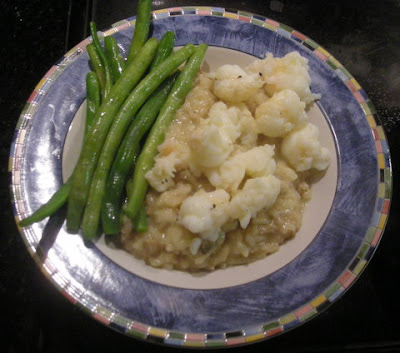

 Additionally, the lines outlining the too-small parking spots have been repainted adjusting the size of each space to be a little larger, at least in some areas. It's hard to get a good photo from a moving car on a cloudy day, but I think that if you look closely, you can see the difference in parking space sizes, as well as the fact that the original lines were not covered up. Both coats of paint are fading away rapidly considering this was only started in August.
Additionally, the lines outlining the too-small parking spots have been repainted adjusting the size of each space to be a little larger, at least in some areas. It's hard to get a good photo from a moving car on a cloudy day, but I think that if you look closely, you can see the difference in parking space sizes, as well as the fact that the original lines were not covered up. Both coats of paint are fading away rapidly considering this was only started in August. In one case a bus was pulled over half in the parking area and half out, completely blocking one lane of traffic unless cars in the other lane paused to let them pass. And of course, taxi drivers still stop in their lane to pick up or discharge passengers.
In one case a bus was pulled over half in the parking area and half out, completely blocking one lane of traffic unless cars in the other lane paused to let them pass. And of course, taxi drivers still stop in their lane to pick up or discharge passengers."Another entire cable was devoted to the shocking Roatan McNab-Anderson-Moore case in which the American citizens' caretaker was forcibly removed in handcuffs from their house by police while they were in the US. When they returned to Honduras a few days later, they were forced by a judge and police to remove their personal belongings from their home in two hours and they found others already living in it! Ambassador Palmer thought this case would be a test of the resolve of the Honduran government in the area of investor rights. Can anyone tell me how that case ended up or is this something that we shouldn't discuss?"

- L.40,000: no tax
- L.40,000 up to L.50,000: L.500
- L.50,000 up to L.100,000: L.600
- L.100,000 up to L.200,000: L.700
- L.200,000 up to L.1 million: L.800
- L.1 million and over: L.1,000

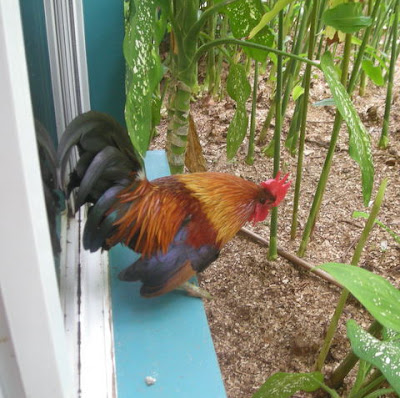
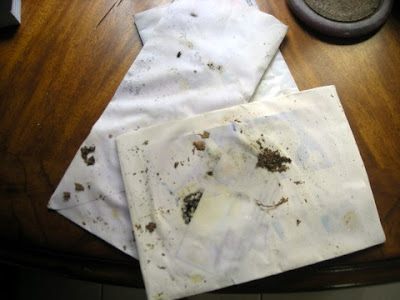
 We used to get our checking account statement (más or menos) monthly, but then the bank started using a private delivery service. Since both were unreliable, I just use online banking to keep up with it. There is not much to keep up with as hardly anyone will accept a check anyway. Other than that and the IRS tax forms (which only make it to me about one year out of three), there isn't much in the way of mail. That's my excuse anyway.
We used to get our checking account statement (más or menos) monthly, but then the bank started using a private delivery service. Since both were unreliable, I just use online banking to keep up with it. There is not much to keep up with as hardly anyone will accept a check anyway. Other than that and the IRS tax forms (which only make it to me about one year out of three), there isn't much in the way of mail. That's my excuse anyway.
 A new Wikileaks-Honduras cable came through on a Google Alert the other day. "Oh, yeah, I forgot about Wikileaks," I thought to myself. So I clicked over to see what was new: Pages and pages of new Honduras-related cables, 50 cables per page. I went through at least 10 pages and still didn't arrive where I had last left off. These latest posted cables were from 2002-2004, when Larry Palmer was US Ambassador to Honduras, and Ricardo Maduro (photo) was president. The majority were "Media response to xyz event" and even though I skipped all of those, I still spent hours reading selected cables.
A new Wikileaks-Honduras cable came through on a Google Alert the other day. "Oh, yeah, I forgot about Wikileaks," I thought to myself. So I clicked over to see what was new: Pages and pages of new Honduras-related cables, 50 cables per page. I went through at least 10 pages and still didn't arrive where I had last left off. These latest posted cables were from 2002-2004, when Larry Palmer was US Ambassador to Honduras, and Ricardo Maduro (photo) was president. The majority were "Media response to xyz event" and even though I skipped all of those, I still spent hours reading selected cables. US Ambassador Palmer (2002-2005, photo) was initially generally very optimistic about changes to be made under new President Ricardo Maduro. It's true, some significant laws were implemented. Personally, with my limited experience with government offices, I saw improvements in service. At least the government employees no longer flagrantly pulled out their wallets and deposited my fees directly into them right in front of me as I had seen a couple of times in my first year in Honduras. Most payments now have to be made at a bank.
US Ambassador Palmer (2002-2005, photo) was initially generally very optimistic about changes to be made under new President Ricardo Maduro. It's true, some significant laws were implemented. Personally, with my limited experience with government offices, I saw improvements in service. At least the government employees no longer flagrantly pulled out their wallets and deposited my fees directly into them right in front of me as I had seen a couple of times in my first year in Honduras. Most payments now have to be made at a bank. Truth scarier than fiction: That was the title of this August 2003 cable in which the Embassy lamented the shocking increase in murder rates but also expounded on the several ways in which they were certain that murder was vastly under-reported, particularly in areas where there is no morgue (most of the country) and where there are no journalists from the major news organizations (again, most of the country), since most statistics are based on morgue reports or the news.
Truth scarier than fiction: That was the title of this August 2003 cable in which the Embassy lamented the shocking increase in murder rates but also expounded on the several ways in which they were certain that murder was vastly under-reported, particularly in areas where there is no morgue (most of the country) and where there are no journalists from the major news organizations (again, most of the country), since most statistics are based on morgue reports or the news."In office for almost two years, President Ricardo Maduro's administration talks a lot about fighting corruption .... Upon close examination, however, one sees little demonstrable progress in breaking corruption's pervasive grip on almost all aspects of daily life in Honduras. Moreover, there appears to be very little genuine interest in addressing corruption's root causes or the venality of many Government of Honduras officials."At that time (2003), Transparency International ranked Honduras 106 in corruption out of 133 countries (fourth lowest in the Western Hemisphere). In 2010, Honduras was in 134th place out of 178 countries, tied with eight other countries. Honduras' score fell from 2.7 (out of 10) in 2002 to 2.4 in 2010. Among many other actors, Palmer pointed to the congress, describing it as,
"riddled with tainted politicians who view their positions heavily through the lens of personal wealth creation. This year alone, three members of Congress have been arrested on drug trafficking charges, and many others continue to be involved in a wide range of other illicit activities."
"Maduro was visibly put-off by the Ambassador's suggestion that Honduras needed to do more on the anti-corruption front. Apart from the fact that Honduras could be found ineligible to receive future MCA funds based on its undistinguished anti-corruption record, Maduro appears more preoccupied with maintaining the political status quo."


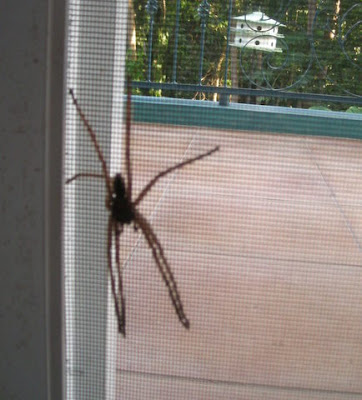
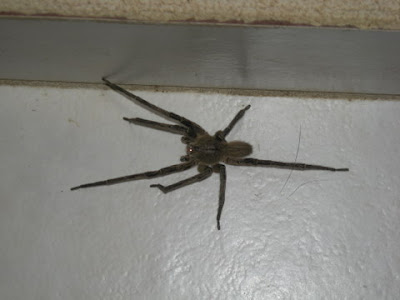

 Marcelo Chimirri, former head of Hondutel, was one of those rare exceptions who did spend a few months in jail before he raised L.4 million bail. Initially he even had the audacity to use government funds to pay lawyers to defend him and the other accused against the corruption charges. Here is Chimirri having a good laugh at the justice system after he was released.
Marcelo Chimirri, former head of Hondutel, was one of those rare exceptions who did spend a few months in jail before he raised L.4 million bail. Initially he even had the audacity to use government funds to pay lawyers to defend him and the other accused against the corruption charges. Here is Chimirri having a good laugh at the justice system after he was released.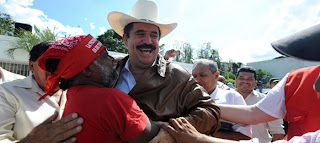
 Mahadeo Roopchand Sadloo Sadloo, better known by his nickname Emo, and one of the most well-known faces of the Resistance (FNRP), was assassinated yesterday at his tire shop in Tegucigalpa. Emo (variously being reported as Emo, Emmo, or Emmoo) was a naturalized Honduran citizen with 12 children.
Mahadeo Roopchand Sadloo Sadloo, better known by his nickname Emo, and one of the most well-known faces of the Resistance (FNRP), was assassinated yesterday at his tire shop in Tegucigalpa. Emo (variously being reported as Emo, Emmo, or Emmoo) was a naturalized Honduran citizen with 12 children. Xiomara Castro de Zelaya, probable FNRP/FARP (Resistance) presidential candidate and wife of Manuel Zelaya, immediately called it a "political crime" and a warning for her husband. That is an extremely interesting spin, since the only documented threats reported by Emo himself were from Mel Zelaya's own bodyguards. Xiomara eulogizes, “Emo has been a bulwark of the Resistance; he has accompanied Mel; he has been at Mel's side", but fails to mention that Mel's bodyguards have used violence in the past four months to keep Emo away from Mel.
Xiomara Castro de Zelaya, probable FNRP/FARP (Resistance) presidential candidate and wife of Manuel Zelaya, immediately called it a "political crime" and a warning for her husband. That is an extremely interesting spin, since the only documented threats reported by Emo himself were from Mel Zelaya's own bodyguards. Xiomara eulogizes, “Emo has been a bulwark of the Resistance; he has accompanied Mel; he has been at Mel's side", but fails to mention that Mel's bodyguards have used violence in the past four months to keep Emo away from Mel. Emo made an official denuncia before CODEH (Committee for the Defense of Human Rights) on July 21, 2011, characterized on CODEH's website as "physical assault and harassment". According to Emo's complaint, although he considered himself a close friend of Zelaya and part of Mel's inner circle, beginning on May 28, 2011, when Mel Zelaya returned to Honduras, he was repressed and beaten to keep him away from Zelaya by Zelaya's bodyguards, who he names in the complaint.
Emo made an official denuncia before CODEH (Committee for the Defense of Human Rights) on July 21, 2011, characterized on CODEH's website as "physical assault and harassment". According to Emo's complaint, although he considered himself a close friend of Zelaya and part of Mel's inner circle, beginning on May 28, 2011, when Mel Zelaya returned to Honduras, he was repressed and beaten to keep him away from Zelaya by Zelaya's bodyguards, who he names in the complaint. CODEH is not a credible organization and it's president Andrés Pavón has made some outrageous, unsupported accusations over the years. Perhaps the most ridiculous was when, in an effort to sabotage the 2009 presidential elections, he reported on a Cholusat Sur television program that he had uncovered a mass assassination plot by the military in which they were going to massacre 1,200 UCD (anti-Zelaya) members during the election in order to blame the massacre on the Resistance. Pavón claimed to have proof and slyly grinned while he showed the cameras two photos of two soldiers standing, doing nothing. The photos could have been taken on any street corner or military installation and showed nothing at all except two soldiers talking to each other. At times during this great revelation, he even appeared to be snickering, as if he himself couldn't believe the gullibility of anyone who would believe this farfetched story.
CODEH is not a credible organization and it's president Andrés Pavón has made some outrageous, unsupported accusations over the years. Perhaps the most ridiculous was when, in an effort to sabotage the 2009 presidential elections, he reported on a Cholusat Sur television program that he had uncovered a mass assassination plot by the military in which they were going to massacre 1,200 UCD (anti-Zelaya) members during the election in order to blame the massacre on the Resistance. Pavón claimed to have proof and slyly grinned while he showed the cameras two photos of two soldiers standing, doing nothing. The photos could have been taken on any street corner or military installation and showed nothing at all except two soldiers talking to each other. At times during this great revelation, he even appeared to be snickering, as if he himself couldn't believe the gullibility of anyone who would believe this farfetched story. However, CODEH published Emo's complaint on their website on July 21, 2011, and included two photos of Emo signing the document, so I tend to believe that Emo actually made the denuncia. Interviewed yesterday, Pavón stated that he had not taken action on the complaint as a week afterward, Emo told him that he had "reached an accord" with the bodyguards. The complaint could have been false, but why? Up until an hour before his death, Emo was supporting Mel Zelaya's corrupt protege Flores Lanza in a protest in which he carried a banner with a likeness of Mel. Could it be that the resistance needs a fresh martyr?
However, CODEH published Emo's complaint on their website on July 21, 2011, and included two photos of Emo signing the document, so I tend to believe that Emo actually made the denuncia. Interviewed yesterday, Pavón stated that he had not taken action on the complaint as a week afterward, Emo told him that he had "reached an accord" with the bodyguards. The complaint could have been false, but why? Up until an hour before his death, Emo was supporting Mel Zelaya's corrupt protege Flores Lanza in a protest in which he carried a banner with a likeness of Mel. Could it be that the resistance needs a fresh martyr?
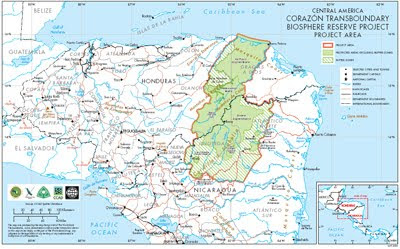 In 1996, the UN declared the reserve to be in danger. It was removed from the endangered list in 2007 due to "significant progress", but was placed back on the list again in June 2011 at the request of the government of Honduras due to the combined threats of illegal logging, fishing and land occupation, poaching and the government's reduced capacity to manage the site, notably due to the deterioration of law and to the presence of drug traffickers. As this video shows, much damage is being done in the protected area.
In 1996, the UN declared the reserve to be in danger. It was removed from the endangered list in 2007 due to "significant progress", but was placed back on the list again in June 2011 at the request of the government of Honduras due to the combined threats of illegal logging, fishing and land occupation, poaching and the government's reduced capacity to manage the site, notably due to the deterioration of law and to the presence of drug traffickers. As this video shows, much damage is being done in the protected area.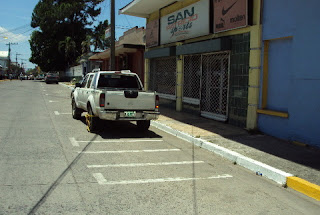 Wherever you see the parking spaces marked in white as in this photo, that means that these are paid parking spots. You must purchase a parking permit from a nearby store or the municipalidad (municipality building) and place it on the dashboard inside your car on so that it can be easily seen by the parking inspectors. Special areas are marked for motorcycles, which do not have to pay for parking, since obviously, permits left on them would be stolen. Additionally, I have heard, but can't verify, that special parking spots marked with blue paint are for specific business owners or managers.
Wherever you see the parking spaces marked in white as in this photo, that means that these are paid parking spots. You must purchase a parking permit from a nearby store or the municipalidad (municipality building) and place it on the dashboard inside your car on so that it can be easily seen by the parking inspectors. Special areas are marked for motorcycles, which do not have to pay for parking, since obviously, permits left on them would be stolen. Additionally, I have heard, but can't verify, that special parking spots marked with blue paint are for specific business owners or managers. Welcome to my Blogicito — spanglish for 'little blog'. I am a US expatriate who has been living here in La Ceiba, Honduras, with my Catracho husband since 2001 and blogging about Honduras and my expatriate life since 2006.
Welcome to my Blogicito — spanglish for 'little blog'. I am a US expatriate who has been living here in La Ceiba, Honduras, with my Catracho husband since 2001 and blogging about Honduras and my expatriate life since 2006.

